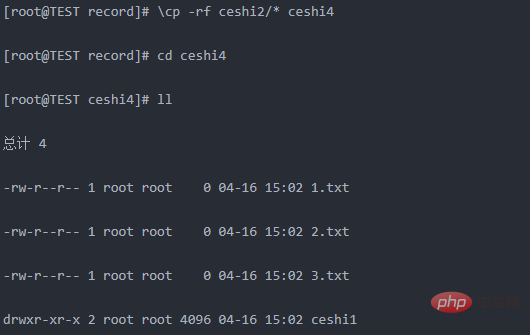
There are two solutions: 1. Use "vi ~/.bashrc" to modify the "/.bashrc" file, and add "#" before "alias cp='cp -i'" to comment it Just delete it, save and exit, and then log in again; 2. When using the cp command, add "\" before "cp" to remove the prompt.

#The operating environment of this tutorial: linux7.3 system, Dell G3 computer.
By default, when cp overwrites, no matter what parameters -f or the like are added, it still prompts whether to overwrite.
The reason is: The server will add the alias alias cp=’cp -i’ by default. When you execute cp, it actually executes cp -i.
[root@ltt01 ~]# alias alias cp='cp -i' alias egrep='egrep --color=auto' alias fgrep='fgrep --color=auto' alias grep='grep --color=auto' alias l.='ls -d .* --color=auto' alias ll='ls -l --color=auto' alias ls='ls --color=auto' alias mv='mv -i' alias rm='rm -i' alias which='alias | /usr/bin/which --tty-only --read-alias --show-dot --show-tilde'
cp cancels the prompt information and directly overwrites it. The user does not need to hit y to interact, which is very important when the script is executed.
The following are two ways to solve this problem.
Method 1: Disable aliases
[root@ltt01 ~]# vi ~/.bashrc
Add "#" before alias cp='cp -i' to comment out this OK, :wq! Save and exit, then log in again.
Method 2: Add \ before cp
[root@ltt01 ~]# \cp 1.txt /back/1.txt [root@ltt01 ~]#

Recommended learning: Linux video tutorial
The above is the detailed content of What should I do if I still get a prompt when setting rf in cp in Linux?. For more information, please follow other related articles on the PHP Chinese website!